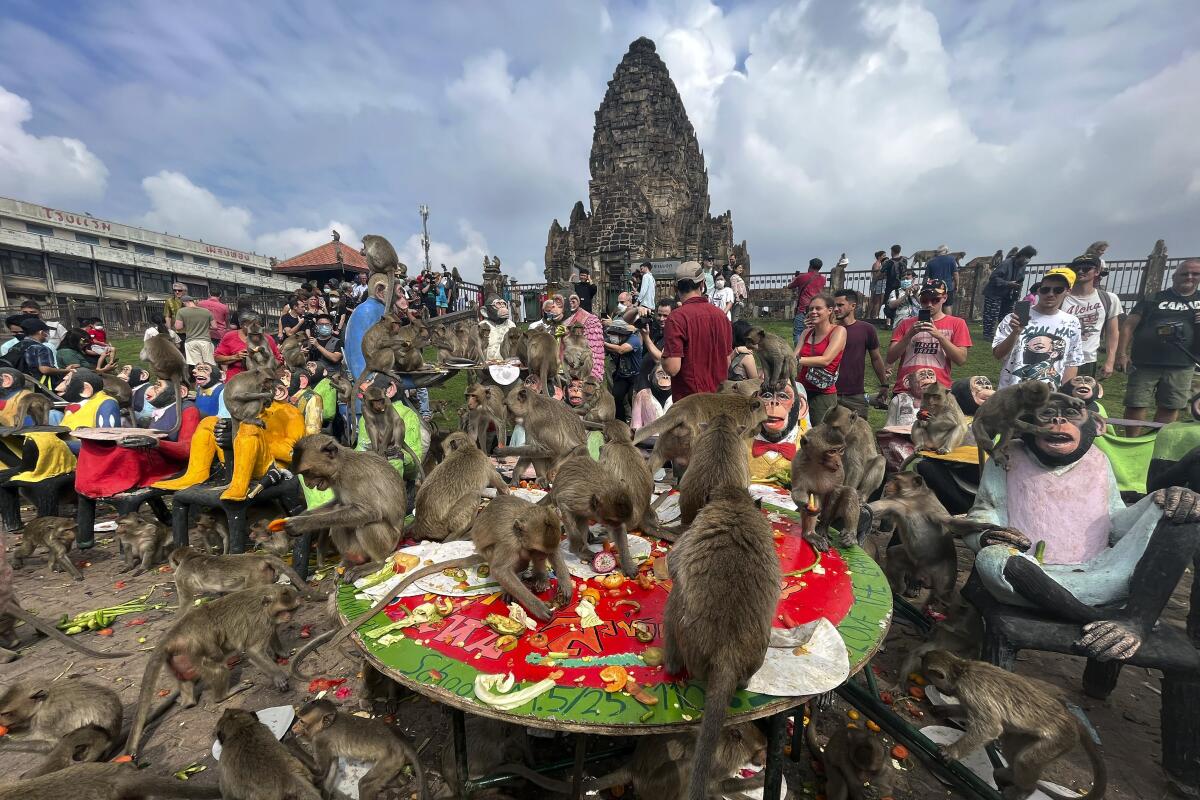Thailand has a plan to contain the monkey mayhem in the popular tourist town of Lopburi

- Share via
BANGKOK — Thai wildlife officials have a plan to bring peace to a central Thai city after at least a decade of human-monkey conflict.
The macaques that roam Lopburi are a symbol of local culture and a major tourist draw. But after years of dangerous encounters with residents and visitors and several failed attempts to bring peace with population controls, local people and businesses have had enough.
The monkeys frequently try to snatch food from humans, sometimes resulting in tussles that can leave people with scratches and other injuries. But outrage grew in March when a woman dislocated her knee after a monkey pulled her off her feet in an effort to grab food, and another man was knocked off a motorcycle by a hungry monkey.
Authorities hope to round up some 2,500 urban monkeys and place them in massive enclosures, said Athapol Charoenshunsa, the director-general of the Department of National Parks, Wildlife and Plant Conservation. They’ll work with wildlife experts to find a way for a limited number of monkeys to stay at liberty in the city, he added.
“I don’t want humans to have to hurt monkeys, and I don’t want monkeys to have to hurt humans,” Athapol told reporters during a news conference in Bangkok.
An official monkey-catching campaign was launched week, prioritizing more aggressive alpha males. More than three dozen monkeys have been caught, and most have been placed put under the care of wildlife authorities in the neighboring province of Saraburi. Others were sent to the Lopburi zoo.
Officials said they plan to capture the rest of the monkeys once the enclosures are complete. Separate cages will be prepared for different troops of monkeys to prevent them from fighting.
Athapol said he expects the first phase of the operation to start within weeks and believes the huge cages will be able to contain thousands of them and “will solve the problem very quickly.”
The monkeys are a symbol of the province, about 90 miles north of Bangkok, where the ancient Three Pagodas temple celebrates an annual “Monkey Buffet” festival during which the primates feast on spreads of fruits and vegetables. Macaques are classified as a protected species under Thailand’s wildlife conservation law.
Some have blamed the city’s monkey troubles on tourists and residents feeding the animals, which they say drew monkeys into the city and boosted their numbers, as well as getting them accustomed to obtaining food from humans.
But an earlier effort to limit feeding may have made things worse, some residents say. Officials began threatening fines for feeding monkeys outside a few designated areas around the main tourist attractions in recent years. But those feeding areas were dominated by a few troops of the highly territorial creatures, while rival bands grew hungry and turned to harassing humans in other areas for food.
Athapol said people shouldn’t see monkeys as villains, saying that the authorities might have not been efficient enough in controlling the population.
People also need to adapt to the city’s monkeys, said Phadej Laithong, director of the Wildlife Conservation Office, explaining that a lack of natural food sources prompts the animals to find food wherever they can, including from humans.
Previous control measures have fallen short. From 2014 to 2023, the wildlife authorities neutered about 2,600 Lopburi monkeys.
Athapol said they are also working in other areas of Thailand that are facing problems with monkeys, such as Prajuab Kiri Khan and Phetchaburi. He said 52 of the country’s 77 provinces report frequent problems from monkeys.
Saksornchai writes for the Associated Press.
More to Read
Sign up for Essential California
The most important California stories and recommendations in your inbox every morning.
You may occasionally receive promotional content from the Los Angeles Times.









